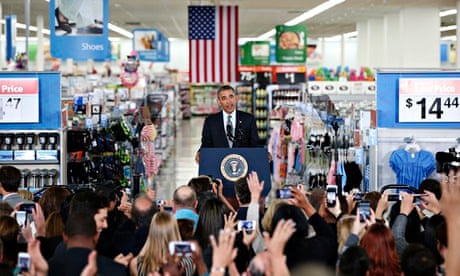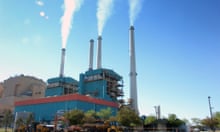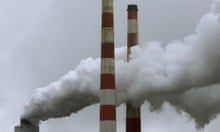US president Barack Obama has laid out his legacy on one of the issues that will define the world long after his brief term in power is over. He has been frustrated in several other attempts to bring climate change to the fore of US politics, with the demise of cap and trade plans a notable failure, but his move to use the Environmental Protection Agency to cap carbon emissions is his boldest effort yet, trying to circumvent the Congressional stalemate on the issue using his constitutional powers.
Climate change is one of the trickiest issues to face for any leader. A long-term problem manifesting first in the poorest regions of the world, that will only make serious inroads into developed economies long after a current politician's half-life is spent. Vested and highly profitable interests – party donors, indeed, and pension funds – that rely on fossil fuels. Contrarian attacks on the clear science that tells us the world is warming, supported by a sceptic media and believed by millions. . No wonder Obama was initially reluctant to take this on.
President Obama has been burned on this issue before – along with dozens of other world leaders, he attended the Copenhagen climate change conference in 2009, but despite reaching the most effective international agreement that the world has yet seen on climate change, that summit was widely jeered in the media. He forged an alliance with developing countries including China and India, but that fell apart in subsequent rounds of fractious talks.
On Monday, the world was finally able to judge where President Obama hopes to take his country. He laid out what was lauded as a "bold" and "historic" vision that – if it is passed – will reduce US greenhouse gas emissions drastically. The response from climate experts was overwhelmingly positive. Lord Stern, author of the 2005 review of the economics of climate change, said: "These new plans should help the US achieve its target of reducing annual emissions of greenhouse gases by 17% by 2020, compared with 2005. This represents real leadership."
Yvo de Boer, former United Nations climate chief, told the Guardian: "It's essential to get the US and China aligned [on climate change] as that is what will make the real difference." He was hopeful that President Obama's stance would make that a reality. Beijing has not yet officially responded to President Obama's announcement, but has its own plans for cutting emissions, partly in response to the air pollution crisis.
In little more than a year's time, this wrangling will become very important: world governments have set themselves a deadline of the end of 2015, at a meeting in Paris, to draft a new global agreement to cut greenhouse gas emissions and halt dangerous climate change. This matters. Where China places itself on this potential treaty will be of vital importance. Europe is certainly behind Obama – one Brussels insider told the Guardian the US and the EU were finally joining forces. Lined up against him, Russia is likely to oppose agreements in international forums, as it has done in the past, as is Australia, while the votes of most developing countries are still up for grabs.
But the biggest hurdle President Obama has to face will not be from his peers in other capitals. The opposition to his historic moves will come from the Republican party, within the toxic world of US politics, and even from his own side. Despite opinion polls that consistently show Americans are concerned about global warming, the forces of climate denial will still do their utmost to oppose any curbs on their power to emit carbon dioxide. And they have a lot of money.




